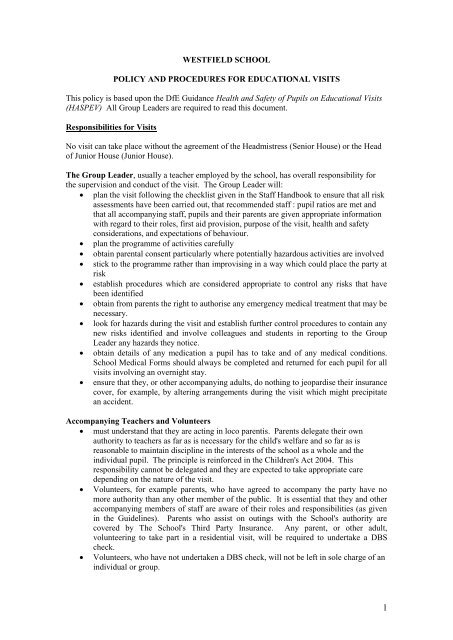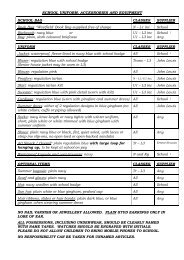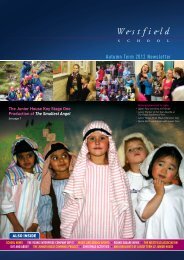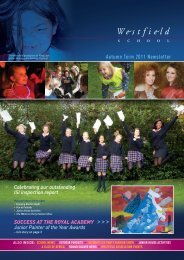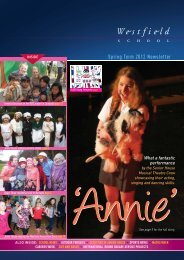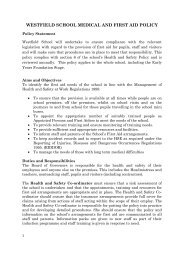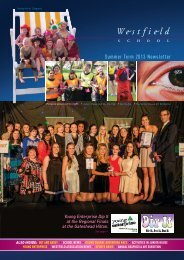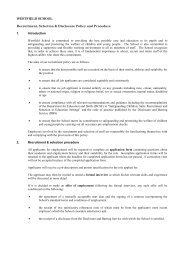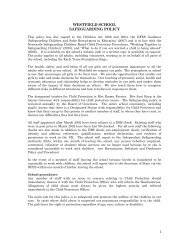educational visits policy.pdf - Westfield School
educational visits policy.pdf - Westfield School
educational visits policy.pdf - Westfield School
Create successful ePaper yourself
Turn your PDF publications into a flip-book with our unique Google optimized e-Paper software.
WESTFIELD SCHOOL<br />
POLICY AND PROCEDURES FOR EDUCATIONAL VISITS<br />
This <strong>policy</strong> is based upon the DfE Guidance Health and Safety of Pupils on Educational Visits<br />
(HASPEV) All Group Leaders are required to read this document.<br />
Responsibilities for Visits<br />
No visit can take place without the agreement of the Headmistress (Senior House) or the Head<br />
of Junior House (Junior House).<br />
The Group Leader, usually a teacher employed by the school, has overall responsibility for<br />
the supervision and conduct of the visit. The Group Leader will:<br />
plan the visit following the checklist given in the Staff Handbook to ensure that all risk<br />
assessments have been carried out, that recommended staff : pupil ratios are met and<br />
that all accompanying staff, pupils and their parents are given appropriate information<br />
with regard to their roles, first aid provision, purpose of the visit, health and safety<br />
considerations, and expectations of behaviour.<br />
plan the programme of activities carefully<br />
obtain parental consent particularly where potentially hazardous activities are involved<br />
stick to the programme rather than improvising in a way which could place the party at<br />
risk<br />
establish procedures which are considered appropriate to control any risks that have<br />
been identified<br />
obtain from parents the right to authorise any emergency medical treatment that may be<br />
necessary.<br />
look for hazards during the visit and establish further control procedures to contain any<br />
new risks identified and involve colleagues and students in reporting to the Group<br />
Leader any hazards they notice.<br />
obtain details of any medication a pupil has to take and of any medical conditions.<br />
<strong>School</strong> Medical Forms should always be completed and returned for each pupil for all<br />
<strong>visits</strong> involving an overnight stay.<br />
ensure that they, or other accompanying adults, do nothing to jeopardise their insurance<br />
cover, for example, by altering arrangements during the visit which might precipitate<br />
an accident.<br />
Accompanying Teachers and Volunteers<br />
must understand that they are acting in loco parentis. Parents delegate their own<br />
authority to teachers as far as is necessary for the child's welfare and so far as is<br />
reasonable to maintain discipline in the interests of the school as a whole and the<br />
individual pupil. The principle is reinforced in the Children's Act 2004. This<br />
responsibility cannot be delegated and they are expected to take appropriate care<br />
depending on the nature of the visit.<br />
Volunteers, for example parents, who have agreed to accompany the party have no<br />
more authority than any other member of the public. It is essential that they and other<br />
accompanying members of staff are aware of their roles and responsibilities (as given<br />
in the Guidelines). Parents who assist on outings with the <strong>School</strong>'s authority are<br />
covered by The <strong>School</strong>'s Third Party Insurance. Any parent, or other adult,<br />
volunteering to take part in a residential visit, will be required to undertake a DBS<br />
check.<br />
Volunteers, who have not undertaken a DBS check, will not be left in sole charge of an<br />
individual or group.<br />
1
Pupils<br />
<br />
<br />
Will be expected to follow instructions and expectations of behaviour as laid down by<br />
the Group Leader.<br />
Will be expected to have regard for the general public and, especially when abroad, to<br />
be sensitive to local customs and codes of dress/ conduct.<br />
Parents<br />
Must sign all consent forms and make the Group Leader aware of emergency contact<br />
numbers and of any special medical needs of their children.<br />
Reinforce with their children the expectations of conduct and pupil responsibilities<br />
made clear by the Group Leader.<br />
Planning Visits<br />
Formal planning and risk assessment must take place for all <strong>visits</strong>, whether this is a<br />
visit to the local park or a residential visit in the UK or abroad.<br />
The Group Leader must carry out a risk assessment and/or obtain risk assessments from<br />
the activity centre, museum or other location prior to the visit. These must be sent to<br />
the Bursar. The Group Leader must supply all accompanying adults with copies of all<br />
risk assessments, including those of a generic nature (e.g for coach travel). Pupils must<br />
also be made aware of their responsibilities with regard to the assessed risks.<br />
Even though a visit may take place each year, fresh risk assessments must be sought on<br />
every occasion.<br />
Where possible Group Leaders should make an exploratory visit to the location of the<br />
visit.<br />
The Group Leader must ensure that insurance policies are in place appropriate to the<br />
visit. The adults who are responsible for pupils on the trip must be fully and<br />
appropriately insured including personal liability. It is essential to know what risks are<br />
excluded from the insurance <strong>policy</strong> since the standard employers liability insurances<br />
provided by the school is unlikely to provide cover for these risks.<br />
The Group Leader must work out a budget in which all expenditure should be listed<br />
and costed; this must be submitted to the Bursar on a ‘Green Form’<br />
The greatest care must be taken over the choice of travel company and checks must be<br />
made that the company is duly bonded, for example, is a member of ABTA or some<br />
similar organisation<br />
First Aid provision should form part of the risk assessment. A First Aid kit,<br />
appropriate to the nature of the visit, must be taken. A member of staff should have<br />
responsibility for First Aid. In the case of Foundation Stage pupils, this will be a<br />
member of staff with qualifications in Paediatric First Aid.<br />
Supervision<br />
<br />
<br />
<br />
<br />
DfE guidelines are followed according to the age of the children.<br />
No ratio is laid down but the concept of reasonableness is important based on the<br />
expertise of the adult supervisors, taking into account the hazards of the visit, the<br />
number, age and aptitudes of the pupils, and the first aid cover required.<br />
It is recommended that at least two adults should accompany any party comprising up<br />
to twenty pupils. In Junior House more than two would be required unless the centre<br />
visited had a permanent resident.<br />
There may be occasions when fewer than two adults might be appropriate, for example<br />
on a French exchange where the students are living with French families in a given area<br />
and one teacher could be billeted in the area with them.<br />
2
Regulations laid down in 1995 and 1996 provide for the licensing of persons in respect<br />
to the provision of facilities for adventure activities such as caving, climbing, trekking<br />
or water sports with the aim of giving assurance that good safety management practice<br />
is being followed. Anyone who provides adventure facilities for young people under<br />
18 in return for payment must have a licence and abide by its conditions.<br />
Headcounts are taken regularly throughout a visit. In some instances particular<br />
clothing will be worn so that pupils can be easily identified; this may be school<br />
uniform, sweatshirts or caps, or, in the case of Early Years pupils, reflective vests.<br />
During some adventurous activities, e.g. Duke of Edinburgh expeditions, the Group<br />
Leader may not physically accompany the pupils. Where this is the case, the Group<br />
Leader will establish the competency of the pupils concerned, ensure that parents give<br />
permission for the expedition and establish procedures for emergency contact.<br />
On a residential visit, as soon as a party arrives at an overnight stop, the Party Leaders<br />
should satisfy themselves that they are familiar with the geography of the buildings and<br />
surroundings and they are certain of the means of evacuation in the event of a fire.<br />
Preparing Pupils<br />
Providing information and guidance to pupils is an important part of preparing for a school<br />
visit. Group Leaders will ensure that the visit is appropriate for all pupils taking part and have<br />
regard to any additional supervisory needs dependent upon the medical requirements of<br />
participating pupils. Pupils should understand and be provided, by both teachers and parents,<br />
with information about:<br />
key safety information<br />
possible risks, safety rules and expectations of behaviour<br />
aims and objectives of the visit<br />
the adults with responsibility for the visit<br />
background information regarding the location and relevant customs or culture of the<br />
location<br />
what to do if separated from the group<br />
emergency procedures<br />
contact telephone numbers in the case of exchange or remotely supervised <strong>visits</strong>.<br />
their own medical needs and who is responsible for any medication they require.<br />
Communicating with Parents<br />
<br />
<br />
<br />
<br />
<br />
Parents will be informed in writing of all offsite activities, and permission sought,<br />
unless annual consent has already been given for routine or regular <strong>visits</strong>.<br />
Details given will include date, time, location, estimated time of return, explanation of<br />
activities, names of accompanying adults, modes of transport and other specific<br />
requirements for the particular visit, e.g. clothing, snacks, money etc.<br />
Before residential <strong>visits</strong>, parents are encouraged to attend a briefing meeting when all<br />
details will be given, including procedures in the case of illness or emergency, luggage,<br />
insurance and equipment requirements, and emergency contact numbers; parents’<br />
questions will be answered at this meeting. Written information will be provided for<br />
those unable to attend the briefing.<br />
Any specific medical consent will be sought well in advance of the visit.<br />
Prior to departure the members of staff organising the visit must leave full details in the<br />
<strong>School</strong> Office and with a member of the Senior Management Team, including a<br />
pyramid of contacts in case of emergency<br />
3
NEGLIGENCE<br />
When negligence is alleged, the case will almost invariably be lodged against the employer<br />
who is vicariously liable and who carries insurance for third party liability. Claims against<br />
individuals are exceedingly rare. <strong>School</strong> journey insurance policies will normally provide staff<br />
arranging a trip with adequate indemnity against individual liability for an accident and<br />
members of professional organisations usually enjoy comprehensive protection against claim<br />
for negligence in the course of their professional duties or related voluntary activities.<br />
Transport<br />
The group leader responsible for organising the visit is responsible for planning the<br />
arrangements for appropriate transport and careful thought must be given to this.<br />
The main factors to consider are:<br />
Passenger safety<br />
Competence of the driver and whether the driver has the appropriate valid licence<br />
Number of driving hours required for the journey<br />
Whether or not more than one driver is required in order to avoid driver fatigue<br />
Type of journey<br />
Traffic conditions<br />
Contingency funds and arrangements in case of breakdown<br />
Appropriate insurance cover<br />
Weather<br />
Journey time and distance<br />
Stopping points for refreshments and toilet<br />
Supervision<br />
The driver is responsible for the vehicle during the visit.<br />
All coaches must be booked through the Bursar/Domestic Bursar or the Secretary of Junior<br />
House. The mini-bus must be booked through the Bursar. All mini-buses which carry groups of<br />
three or more children aged between 3 and 15 years, inclusive, must be fitted with a seat belt<br />
for each child. The seats must face forward and seat restraints must comply with the legal<br />
requirements.<br />
Supervision on transport<br />
The group leader is responsible for the party at all times including maintaining good discipline.<br />
If possible the driver should not be responsible for supervision unless a small number of older<br />
children are being taken on a short journey. Group members should be made aware of the<br />
position of the emergency door and first aid and anti-fire equipment on the transport.<br />
Pupils should be made aware of safety rules and expected standards of behaviour on<br />
the coach or mini-bus and at pick-up and drop-off points.<br />
<br />
<br />
<br />
<br />
Group leaders should plan with the driver sufficient stops, at suitable areas to ensure<br />
the safety of all group members including the driver. (Drivers of coaches/buses must<br />
comply with legislation covering maximum periods of driving and minimum rest<br />
periods.<br />
In the event of an accident or breakdown – the group should remain under the direct<br />
supervision of the group leader or other teachers wherever possible.<br />
A check must be made to ensure that seat belts are fastened.<br />
Pupils should be made aware they are not allowed in the driving area at any time<br />
4
Travel sickness tablets can only be administered to a pupil with previous authorisation<br />
from parents.<br />
Insurance<br />
The group leader must ensure that adequate insurance arrangements are in place and parents<br />
should be made aware of the arrangements.<br />
<strong>Westfield</strong> cover provides:<br />
Employers’ liability - £10m<br />
Public liability - £25m<br />
<br />
<br />
<br />
<br />
<br />
<br />
Personal accident cover for pupils<br />
Cost of medical treatment – pupils’ accident cover and employers’ liability<br />
Specialised risk activities – skiing is covered but other risk activities will need specific<br />
insurance<br />
Compensation for loss of luggage and against cancellation – school travel insurance<br />
Legal assistance in the recovery of claims<br />
Damage to/loss of hired equipment – public liability<br />
Cancellations<br />
Most school <strong>visits</strong> are paid for using the school credit card and the usual credit card<br />
cancellation/refund procedures will apply.<br />
Transport<br />
Only coach companies with appropriate insurance should be used. The school mini-bus is<br />
serviced annually by Newcastle City Council and is insured for use in this country. Drivers of<br />
the school mini-bus have undergone a mini-bus drivers’ test, have had their licences checked<br />
and hold appropriate insurance. Teachers and other adults using their own cars to carry pupils<br />
on school <strong>visits</strong> must ensure their vehicles are properly licensed and that their insurance covers<br />
school business. <strong>School</strong> insurance does not provide cover in these circumstances.<br />
Types of Visit<br />
Adventure Activities Using Licensed Providers<br />
When planning to use essential activity facilities offered by a commercial company, the group<br />
leader should check whether the provider is legally required to hold (and actually holds) a<br />
licence. The adventure activities licensing authority can check on the licence status of the<br />
provider. A licenced provider does not necessarily have to hold a licence for all activities. The<br />
following, where undertaken by young people under 18 years, unaccompanied by a parent,<br />
need a particular licence:<br />
Caving<br />
<br />
<br />
<br />
Climbing<br />
Trekking<br />
Water sports<br />
(please refer to DfE guidance for full details).<br />
5
If proposing to use a non-licensable provider, the group leader should obtain assurances from<br />
the provider regarding: risk assessments, competence, equipment, operating procedures, safety<br />
systems, first aid and emergency procedures. The group leader and teachers retain ultimate<br />
responsibility for pupils at all times. The provider is responsible for the safe running of an<br />
activity.<br />
<strong>School</strong> led adventure activities<br />
The group leader should follow the guidelines set out in the staff handbook regarding<br />
competency, first aid, risk assessments, supervision and equipment. If an unlicenced freelance<br />
provider of adventure activities is employed the school takes full legal responsibility for all<br />
aspects of the activity.<br />
Remote Supervision, for example Duke of Edinburgh Activities<br />
Precise and clear information must be passed to students before supervision is withdrawn.<br />
Pupils should have received sound, thorough training which should have been separately<br />
assessed. The instructor should be appropriately qualified and satisfied that the group has the<br />
necessary skills. The group should be shadowed, checked regularly or checked occasionally<br />
depending on their competency. They should be fully prepared in the use of equipment.<br />
Coastal Visits, Swimming in Natural Water, Swimming Pools<br />
Take all reasonable precautions<br />
<br />
<br />
<br />
<br />
<br />
Observe all warning flags and signs<br />
Be aware of natural and man made hazards<br />
Swimming or paddling must be formally supervised<br />
A designated teacher must have relevant life saving awards<br />
The group leader should assess risks and consider a safe supervision ratio for their<br />
particular group in swimming pools<br />
Farm Visits<br />
Extreme care should be taken with regard to physical safety and hazards associated with ecoli<br />
0157, food poisoning and other infections. Further advice is available in the DfE’s letter, dated<br />
9 June 1997 “Pupils’ Visits to Farms: Health Precautions” and the HSE’s “Avoiding Ill Health<br />
at Open Farms: Advice to Teachers”.<br />
Residential Visits<br />
There should be one teacher for every ten pupils, with at least one teacher from each sex for<br />
mixed groups. The following must be considered:<br />
Ideally the group should have adjoining rooms with a teacher next to the pupils<br />
<br />
<br />
<br />
<br />
There should be separate male/female sleeping and bathroom facilities<br />
Security arrangements should be checked<br />
Safety arrangements – where possible, pupils should not be in ground floor rooms,<br />
balconies should be stable and windows secure. Electrical connections should be safe.<br />
The fire alarms should be audible.<br />
There should be adequate storage, drying and recreational facilities<br />
6
There should be provision for those with special needs and those who fall sick<br />
VISITS ABROAD<br />
Much of the earlier advice in the <strong>policy</strong> applies to <strong>visits</strong> abroad.<br />
Organising Your Own Visit<br />
If a package abroad is organized without the help of an outside body then the advice would be<br />
to use a package organiser who has responsibilities under directive 90/314/EEC. A package is<br />
defined as a combination of any two of: accommodation, transport or other tourist services not<br />
ancillary to transport.<br />
Organising Transport<br />
Group leaders should ensure that drivers taking groups abroad are familiar with driving abroad.<br />
EC regulations require the fitment and use of a tachograph and prescribe limits on driving time<br />
and minimum requirements for rests. DETR can provide further advice. Important factors to<br />
consider include: be aware of different legislation and regulations, be aware of tachograph<br />
regulations which normally apply to any vehicle with nine or more passenger seats, see<br />
document “Taking a Minibus Abroad” (DETR). Group members should be aware of right hand<br />
drive traffic, carrying capacity and loading requirements.<br />
Using a Tour Operator<br />
The group leader should check whether the package is covered by ATOL (Air Travel<br />
Organisers Licence). If not, the group leader must show evidence of other forms of security to<br />
provide for the refund of advance payments and the cost of repatriation in the event of<br />
insolvency.<br />
Operator Based Abroad<br />
Group leaders should refer to directive 90/314/EEC which applies to all state of the European<br />
Economic area. Further advice can be obtained from the DTI, the <strong>School</strong> Group Travel<br />
Association, <strong>School</strong> Journey Association and the FCO.<br />
Planning and Preparation<br />
Staff ratios will vary according to the activity, age and sex of the pupils and the<br />
location of the visit.<br />
<br />
<br />
<br />
<br />
<br />
<br />
A minimum ratio of 1 adult to 10 pupils, with at least two of the adults being teachers.<br />
Pupils should be well prepared with regard to language, culture, drugs, alcohol, food,<br />
drink, money, use of phones and what to do in an emergency.<br />
A briefing meeting for parents is extremely important.<br />
Refer to “Health Advice for Travellers anywhere in the World” to find out if<br />
vaccinations are necessary.<br />
The group leader should check that the group has comprehensive travel insurance.<br />
It is advisable that one of the adults is able to hold a basic conversation in the language<br />
of the country being visited.<br />
Visas and Passports<br />
Visas and passports should be organised well in advance. Photocopies of passports should be<br />
taken. Information regarding visas and passports may be obtained from the Home Office or<br />
7
the Central Bureau for Educational Visits and Exchanges. If a pupil is the subject of a care<br />
order or is a ward of court the Headmistress should seek advice from social services or the<br />
court.<br />
Emergency Medical Facilities<br />
Form E111 from the DSS should be completed by the child’s parent. For treatment within the<br />
EU, all participants in the visit should carry their European Health Insurance Card. The group<br />
leader should take:<br />
Tickets<br />
<br />
<br />
<br />
<br />
Passports and visas (and European Health Insurance Cards, where applicable) with<br />
photocopies and a record of the numbers of all of these documents<br />
All contracts, medical forms, parental consent forms, phone numbers and addresses of<br />
parents and the numbers of the Headmistress and school contact<br />
List of group members, details of all insurance, names and address and telephone<br />
number of accommodation<br />
Location of medical services<br />
Information retained at the school:<br />
Contract numbers and the full itinerary of the group<br />
<br />
<br />
List of group members and their details, including additional telephone numbers and<br />
the next of kin<br />
Copies of all parental consent forms, travel documents, insurance documents, medical<br />
papers and any other contracts<br />
During the visit the group leaders should take all reasonable steps to ensure the safety of<br />
individuals and the group and should brief group members on what to do in case of an<br />
emergency.<br />
Exchange Visits<br />
Pupils should be made aware of the ground rules agreed between the group leader and the host<br />
families. The group leader should ensure:<br />
Satisfactory and appropriate caring arrangements<br />
<br />
<br />
The pupils staying with families have easy access to their teachers, usually by<br />
telephone<br />
Parents understand that children living with host families will not always be under<br />
direct teacher supervision<br />
In vetting host families refer to point 238 of HASPEV.<br />
Emergency Procedures<br />
The group leader usually takes charge in an emergency and should liaise with the representative<br />
of the tour operator if one is being used. The school contact should provide the link between<br />
the group and school and to provide any necessary assistance. Everyone involved in the trip<br />
should be aware of what will happen in the event of an emergency.<br />
If an Emergency Occurs:<br />
Establish the nature and extent of the emergency, as well as the names of the casualties<br />
8
Obtain immediate medical help<br />
Ensure a teacher accompanies the casualty to hospital<br />
Notify the police (if necessary), and the school contact<br />
Keep careful notes and details of actions, including witness details<br />
Notify the insurer, tour provider/operator<br />
Complete an accident form<br />
No one should speak to the media or discuss legal liability<br />
Updated September 2013<br />
Appendix A<br />
GUIDELINES FOR TEACHERS, PARENTS AND OTHER ADULTS WHO<br />
ACCOMPANY A SCHOOL VISIT<br />
The person responsible for the visit must ensure that the necessary risk assessments have been carried out<br />
or obtained and that these are made known to the pupils and any accompanying adults. First aid<br />
materials must be taken on the visit and information obtained regarding the medical needs of specific<br />
pupils. In the case of Nursery and Kindergarten children, one member of staff accompanying must have<br />
a Paediatric First Aid qualification.<br />
Volunteers accompanying <strong>visits</strong> need not be DBS checked unless they are accompanying a residential<br />
visit and providing that they do not have unsupervised contact with any pupil or group of pupils.<br />
Any adult accompanying a visit will be acting in loco parentis; this means in the place of the parent.<br />
Consequently you are expected to take care of the children in the same way that you would take care of<br />
your own. The safety of each child is of paramount importance and must never be jeopardised.<br />
The children will be divided into friendship/<strong>educational</strong> groups and each adult will be allocated a group<br />
of children for whom she/he is primarily responsible. The adult does not need to be in the centre of this<br />
particular group at all times, but should always be aware if one member of the group is lagging, missing<br />
or running ahead.<br />
At certain key moments we will all take a head count of our particular group and ensure that we know<br />
where each group member is.<br />
There are certain situations that we wish to avoid :<br />
<br />
<br />
<br />
We do not want the speedy ones to set off at too fast a rate so that they become detached and out of<br />
our control<br />
We do not want the slow movers to lag behind so that they are crossing roads etc after the main<br />
group<br />
We do not want anybody unexpectedly holding up the group because the want to buy something,<br />
have lost something, need the toilet etc.<br />
If any of these eventualities occur and if they can not be avoided, the child must inform the nearest adult<br />
so that the group as a whole can be made aware of any delay.<br />
9
The children must be as obedient to all the adults as they would be to any teacher in school. If there is<br />
any disobedience to the adult in charge of a particular group, then that child will be put in the group of<br />
one of the teachers. This is particularly true when out in the street, on transport, shopping and whenever<br />
safety is concerned.<br />
The good name of the school must always be uppermost in the minds of the party as a whole and there<br />
must be no behaviour which would compromise it. Consequently, there is never any access to unsuitable<br />
activities, drinks, company and locations of which parents and school would disapprove.<br />
It is always preferable to treat the children with as much sympathy and generosity as possible so that they<br />
can look back on the trip as a rewarding and positive experience. However, they are under an obligation<br />
to ensure that they behave with as much co-operation and maturity as possible. For example, they should<br />
all be ready to leave at a certain time in the morning. They should be equipped with everything they<br />
need for the day. They should not hold up the group as a whole on activities.<br />
Because being with large groups of children can be tiring, the adults must help each other. If one is<br />
exhausted then the other adults need to allow him/her time alone to recuperate.<br />
No adult should ever act unilaterally (ie suddenly disappear, change arrangements without consultation,<br />
suggest an event in front of the children without properly consulting with the other adults first).<br />
Accompanying adults must be given a copy of the up to date risk assessment and it must be made clear to<br />
the pupils the part they must play in ensuring their own safety by taking care and listening closely to<br />
instructions.<br />
Updated September 2013<br />
10


